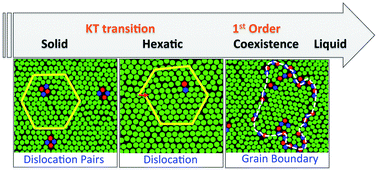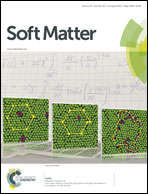Two-stage melting induced by dislocations and grain boundaries in monolayers of hard spheres†
Abstract
Melting in two-dimensional systems has remained controversial as theory, simulations, and experiments show contrasting results. One issue that obscures this discussion is whether or not theoretical predictions on strictly 2D systems describe those on quasi-2D experimental systems, where out-of-plane fluctuations may alter the melting mechanism. Using event-driven molecular dynamics simulations, we find that the peculiar two-stage melting scenario of a continuous solid-hexatic and a first-order hexatic–liquid transition as observed for a truly 2D system of hard disks [Bernard and Krauth, Phys. Rev. Lett., 2011, 107, 155704] persists for a quasi-2D system of hard spheres with out-of-plane particle motions as high as half the particle diameter. By calculating the renormalized Young's modulus, we show that the solid–hexatic transition is of the Kosterlitz–Thouless type and occurs via dissociation of bound dislocation pairs. In addition, we find a first-order hexatic–liquid transition that seems to be driven by spontaneous proliferation of grain boundaries.


 Please wait while we load your content...
Please wait while we load your content...